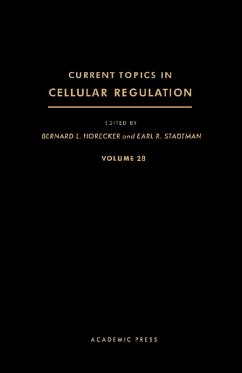Current Topics in Cellular Regulation: Volume 28 is a collection of papers that deals with enzyme-enzyme interactions, regulation of metabolic reaction pathways, the relevance of intracellular amino acid pool in the regulation of protein metabolism, and the production of superoxide by phagocytic leukocytes. Other papers discuss the regulation of adrenergic receptor function by phosphyrylation, a membrane-bound metallo-endopeptidase (meprin), as well as the covalent modification as a mechanism of marking proteins for degradation. One paper notes that the transfer pathway involving enzyme-enzyme recognition is associated with molecular specificity features over those demanded by the molecular structural constraints of the individual enzyme sites. The Albery and Knowles principle, under certain conditions, shows that intermediary metabolites within a particular pathway exist in states of nearly equal free energy. One paper describes that the amino acid pool size and content are governed by the conditioning of intracellular proteins and the metabolic activity of the cell. The paper also suggests that intracellular pools do not regulate protein metabolism. The collection can prove beneficial for biochemists, micro-biologists, cellular researchers, and academicians involved in the study of cellular biology or physiology.
Dieser Download kann aus rechtlichen Gründen nur mit Rechnungsadresse in A, B, BG, CY, CZ, D, DK, EW, E, FIN, F, GR, HR, H, IRL, I, LT, L, LR, M, NL, PL, P, R, S, SLO, SK ausgeliefert werden.









